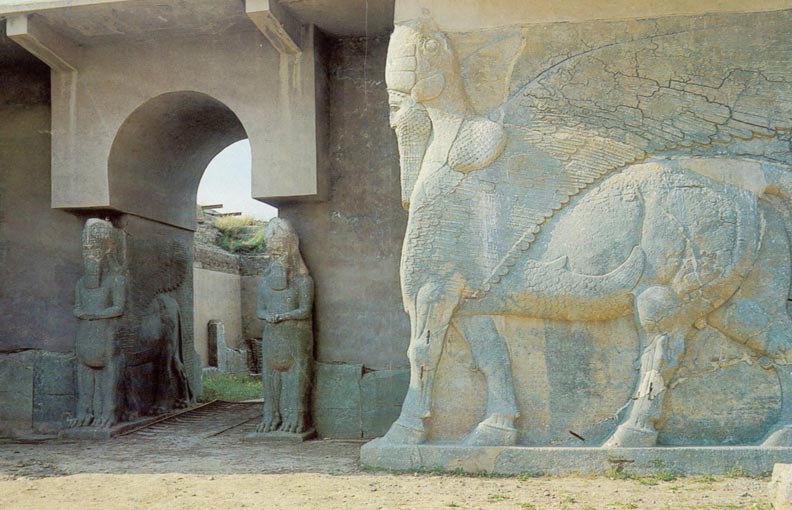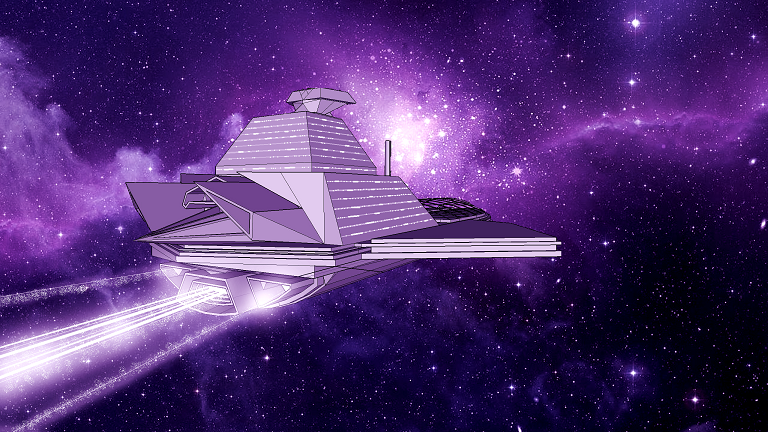Ce qui embellit le désert, dit le petit prince, c’est qu’il cache un puits quelque part.
What makes the desert beautiful is that it hides, somewhere, a well.
Antoine de Saint Exupéry
The so-called “Islamic State” infesting Syria and Iraq, is on a crusade against Islam’s Prophet. It sees his work as incomplete and unjust, so the “Islamic State” must do what Mohammed failed to do: destroy the ancient cities he ignored.

Carvings in the ancient Assyrian city of Nimrud, allegedly demolished by the so-called Islamic State
Followers of the Islamic State are proud of their conquest of swathes of Syria and Iraq, and indeed there is some tactical merit in what they have managed to accomplish with such scant military equipment. It is a military case study that will be remembered alongside the famed blitzes in Europe that shocked the world press in 1939 and 1940, leading to gross exaggerations. At that time in Europe, a seemingly surrounded and hopeless Germany with a few ill-equipped horse-drawn armies quickly devastated and humiliated the great victors of World War 1 in mere months. They paraded unremarkable tanks through Paris, seemingly reversing the dishonor that Germans had felt in the aftermath of the unavailing and pointless World War 1.
Sunnis have been plagued by feelings of similar dishonor to the Germans of post-1918, as a result of the crushing injustices seemingly imposed on them by the armies of the United States in countries like Afghanistan in 2001 and Iraq in 2003. Many, particularly in the male and youth demographic, regard the so-called Islamic State in much the way Germans saw the Nazi Party: knights in shining armor, saviors coming to deliver them on a trail of military glory that will make them the terror of the world and teach the whole world a lesson not to mistreat their people again.
The comparison to Nazi Germany is quite sound in that, although at first the militants appeared to relieve a sense of dishonor, they started a series of events that would bring not only unprecedented dishonor and disgrace but total defeat for them. The Islamic State has invited the wrath of the entire world, and has no hope of survival but complete destruction. When its organization has been dismantled and its cowardly leaders hunted down and dragged through the dirt in the street like criminals, the people who supported this organization will bring nothing but disgrace to their names and suffer a new pain and humiliation beyond anything they had tried to relieve by supporting this group. The fanatics who clung to the Islamic State will pay like the Nazis, by losing not only their honor but their lives.
There is also more flatteringly, if you will forgive me, a comparison to be made between the so-called Islamic State and the original followers of the Prophet Mohammed, who also were confronted with heavily armed enemies and unjust regimes, and defeated in them in what was perceived as a righteous military campaign. However, that is where the comparison ends. Followers of the Islamic State represent themselves as being truthful to the vision of Islam’s great Prophet, and even helping to complete his work by destroying idols and restoring a righteous form of rule. They accomplish none of these things. The Prophet Mohammed completed his work, and his story is a sufficiently triumphant one already. It does not need to be completed by masked criminals parading around with knives and slaughtering unarmed hostages. Now we see people trying to complete what they see as Mohammed’s unfinished work, these would-be prophets who now presume to act in Mohammed’s name by calling themselves the Islamic State.
Al-Baghdadi, a better prophet?
The belief of Islamic State fighters, although they will never admit it, is that they dislike their own Prophet Mohammed and consider him to be an infidel. The Prophet Mohammed, whom even non-Muslims cherish as one of the greatest warrior-saints in all history, is an insufficiently pure role model for the Islamic State’s revisionist purposes. The Islamic State needs its so-called “Caliph Ibrahim”, the criminal fugitive Abu Bakr al-Baghdadi, to be their prophet instead, along with Osama bin Laden and other modern terrorists who cowered and plotted atrocities rather than preaching the good governance and peace-making that defined the successes of the Prophet Mohammed and subsequent Islamic rulers. The so-called Muslims who use their time to assault their own community and heritage, and incite sectarianism among their people, are admitted enemies of the reconciliation and unification that Mohammed brought to the regions over which he ruled.
The regions occupied by the alleged Islamic State in Iraq and Syria are not new to Islam, nor were they unknown to the Prophet Mohammed himself, who surely knew of them even if he did not visit them. It would have been remarkable for Mohammed to have not known about the remnants of ancient Pagan cities within these lands long-controlled by Muslims such as Syria. For centuries, Muslims tolerated profane (even obscene) stone carvings in Egypt until Englishmen arrived and – their Victorian sensibilities being offended – chiseled them away. Yet, for all their offensiveness to Islamic custom, Mohammed and his immediate successors who conquered these regions actually left these markings alone. Despite ruling over North Africa and Mesopotamia for centuries, alleged Muslims have only now decided to go to great lengths to destroy what they reject as offensive Pagan idols. Why?
By what authority does the Islamic State presume to know better than Mohammed or his immediate successors? By what authority does the Islamic State presume to know better than God, or the natural forces that will inevitably erode and bury all these idols of a long-forgotten past? There is no particular urgency for Muslims to destroy old Pagan cities and idols now, although one could argue that modern explosives make the task somewhat easier. For all the Islamic State knows, Mohammed didn’t pursue the destruction of these Pagan sites and idols in his lifetime because he didn’t care, just as successive Muslim conquerors and followers didn’t care.
What can be understood from the actions of the Islamic State is that they cannot be regarded as the same people who have hitherto been known to the world as the Muslims. The people who follow the commands of the Islamic State are following another religion entirely from the historic Islam. It is a religion based upon the passions, whims and ignorance of modern warlords waving guns and bombs around, who know little about practicing Islam and far more about celebrating their own deeds and pretending to know better than their own Prophet. In some sense, the destruction of Pagan sites by the Islamic State is itself a form of Pagan idolatry, a profane attempt to draw attention to themselves and appear to be superior to others, endowed with special powers for some profane physical deed, and superior even to the apparently incomplete Prophet whose work they are attempting to revise. These sites, after all, had not been sites of religious devotion for centuries until the “Islamic State” arrived to strut around them. In essence, primitive worship had been dead a long, long time at these sites until the latest thugs and idiots announced themselves and began a new self-indulgent display of attention-seeking, this time by assaulting lifeless monuments.

Easter Island Heads, also known as Moai
What next? Will these pious men go to the Moai of Easter Island, to educate the world in the dangers of obsessing over lifeless monuments and self-indulgent beliefs, by a further demonstration of their own such stupidity?
If the rule of Mohammed and his immediate successors, and indeed centuries of Islamic thought and practice, was insufficiently pure for the Islamic State, what would Mohammed say about the Islamic State? If the great Muslim conqueror Saladin was an infidel for his lack of interest in defacing statues and destroying historic sites in Syria as the Islamic State does, what would he say about the Islamic State? Supporters of the Islamic State should re-evaluate themselves in comparison with other great figures in Islamic history, most of all their own Prophet. How could they be remembered as anything but arrogant, destructive and misguided in contrast with greater men?
The Islamic State’s followers claim to idolize the Prophet Mohammed. They are lucky he isn’t alive to say what he would think of them. To the man who actually brought Islam to the world, the so-called Islamic State would appear filthy and deserve nothing but contempt. For the “Islamic State” to presume that Mohammed’s work was incomplete, and parade itself around and claim to finish his work, as if they are truer Muslims than their own Prophet, is the gravest possible offense that can be perpetrated against the memory of Islam’s founder.
If the Heaven promised to Muslims is real, it may have little room for me, but it would have even less room for the liars who strutted around modern Iraq and Syria claiming to know better than their own Prophet or the centuries of Islamic jurisprudence that followed from that rule. If followers of the Islamic State believe in a hell, they should spend their last earthly hours atoning for their crimes and thinking about their fate before they choose to die like flies.


